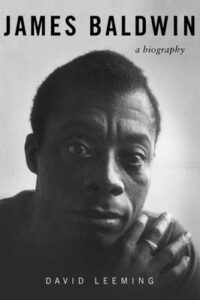 Summary: James Baldwin’s chosen biographer, his friend and sometimes secretary and translator David Leeming.
Summary: James Baldwin’s chosen biographer, his friend and sometimes secretary and translator David Leeming.
After reading my last Baldwin book, I knew I needed to read a complete biography before reading more of Baldwin’s writing. Previously, I have read three novels (Go Tell It on the Mountain, Giovanni’s Room, and If Beale Street Could Talk) and three essay collections (The Fire Next Time, Notes of a Native Son, and No Name on the Street). In addition to those, I have read three books about Baldwin that had biographical aspects but were not primarily a biography, Begin Again by Eddie Glaude, What Truth Sounds Like by Michael Eric Dyson, and James Baldwin and the 1980s by Joseph Vogel.
David Leeming was James Baldwin’s friend and his hand-chosen biographer. This biography was originally published in 1995, nine years after Baldwin’s death. Leeming first met Baldwin in Instanbul, where Leeming was a professor and Baldwin was staying with a friend trying to write. One of the constant refrains of this biography is that Baldwin needed people around him, but he couldn’t write with people around him. So there was a tension between his ability to draw people to him and his need to get away from those people so that he could write, in part because of the costs of having those people around him.
Leeming started working for Baldwin as a secretary and continued working for him in various capacities for years. The close friendship and historical memory that Leeming brings to the biography is a real strength because Leeming was actually in the room for many events of the book, including his last days. At the same time, there is always a bit of a mistrust about biographers that are too close to their subject. The concern is about how that relationship distorts their perceptions. Leeming does not seem to have a problem allowing Baldwin to be a flawed individual. Baldwin for all of his brilliance was flawed. And Leeming had access to all of Balwin’s papers, as well as many personal conversations. The intimacy of the narrative and genuine affection make for a very compelling read.
But I also wonder if there will be a new complete biography of Baldwin because he has been so much the figure of our current racialized era. Dyson and Vogel’s mini-biographies about small segments of Baldwin’s life are worth reading, but I really needed the whole scope of Baldwin’s life to get his story right in my head. I realized that I had learned Baldwin’s story from Baldwin’s essays and those essays are primarily telling a story for a point, not presenting a timeline. In my head, I had The Fire Next Time written before Notes of a Native Son and Another Country as a later novel. Because Baldwin is such an autobiographical writer, that structure of his life, and the deeper context for his life I think will help me read his books more clearly.
As always, the more I read about Baldwin, the more I want to read Baldwin. I also can’t help but think about Baldwin in comparison to others. As I have said before, my grandmother was a new immigrant to the US in 1926 and she lived in Harlem from 1926 until 1931, from 12 until 18. She was a new immigrant and only spoke Finnish initially. Baldwin was only 2 when she moved to Harlem and was around 8 when she moved. I don’t have any fantasy that she may have interacted with him any more than I think that Baldwin and Deitrich Bonhoeffer had any interaction even though they were both in Harlem in 1931. But what I do find interesting is how much Baldwin’s relationships mattered to his long-term life. One of his early mentors (and high school teachers) was poet Countee Cullen, who was WEB DuBois’ son-in-law and the author of The Black Christ, which James Cone and others have pointed to connecting lynching with Christ’s crucifixion.
It was not surprising to me that Baldwin knew Richard Wright given that Baldwin followed Wright’s path to Paris, but I was surprised to read that Wright met Baldwin at the airport and helped him get his first Paris room. Baldwin also met Marlon Brando before either was famous and their friendship continued for decades. Baldwin new people and I think his ability to relate to people was part of why he is such a good writer.
If anyone has a suggestion for another complete biography, I would like to read another one in the next year or so, but I was very happy to read this one.
James Baldwin: A Biography by David Leeming Purchase Links: Paperback, Kindle Edition, Audible.com Audiobook